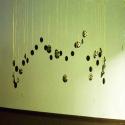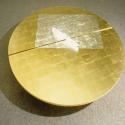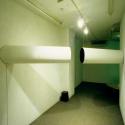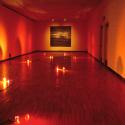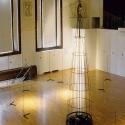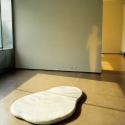Fukawa, Hirokazu
Artist Website
"I am interested in re-experiencing and re-creating a moment of personal epiphany through art. We have all had eye-opening experiences, however, we have not always understood them for what they are. You may have known what you experienced but could not verbalize it or you did not trust what you had experienced because what you encountered was beyond your comprehension. Something can be too new or too profound to be able to fully realize what it is. I want my work to remind viewers of those kinds of experiences and I want to engage these experiences myself through art making.
The internal dialogue about new or profound experiences is usually initiated by perception. Each one of us lives in his or her own perceptual world and each is different. Our perceptual processing system is under the influence of our internal command center so we tend to see what we want to see and hear what we want to hear. Therefore, communication problems are inevitable. But this difference is also a source of originality and individuality. It is one of the origins of art too. Everyone has a potential for art.
Sculpture has recently become a much more broadly defined field of artistic activity, in terms of its materials, its forms, its sites, its presentation, its interaction with other practices as well as its meanings. These shifts do not necessarily change its function. Aesthetics is still a marriage of beauty and philosophy. However, these developments have led to another level of understanding from me. In short, I have other questions. What would beauty be without philosophy? Would it be something else which still looks like art? If a sculpture contains philosophically important questions, dose the visual appearance make any difference in its aesthetic quality? What does it mean to combine emotions with ideas? As I define myself as a conceptually based artist, these are critical questions which I constantly ask myself.
It is more important for me that art is a vehicle of content rather than just beauty itself. What I mean by content here is individual perception, not necessarily concrete issue. Beauty is ephemeral even if it is an eternal notion. I simply believe ideas also invite unexpected visual appearances in art in general and, for me, it is the best way to find new aesthetics. Art provides a certain point of view to see, to know, and to experience the world, and like science, a way to investigate our universe. People should be able to use art as an instrument of perception and to encourage better communication. In other words, art can be a device for probing humanity more deeply.
These premises, epiphany, perceptive and communicative issues, and probing humanity are my main investigations as an artist. For these reasons I do not ally myself with a single or specific medium. I confine myself to specific motives and subjects rather than to abstract and general notions. I search for the best materials and media for the theme, concept, and expression I am developing. I explore many research materials pertaining to a specific issue or theme I have chosen in order to relate to it more closely. Often these processes take many hours of research before I start to make the actual art piece. The research process creates another full layer beneath the visual elements of my art. It has the same importance to me as the physical building process of what you see on the surface. I enjoy both processes equally, the material and the conceptual.
Traditionally, the Japanese are trained to see beauty in a small daily activity, yet [many] people experience every day life with little philosophical or aesthetic connection. Art helps us connect our everyday experiences with a deeper contemplation and it does this in ways that cannot be communicated by language alone. Only art can create these kinds of connections. In this way we may experience daily life in a new, mysterious way. It is an artistic experience that everyone can have, a way to perceive the world dynamically."
Hirokazu Fukawa, Artist Statement, [2002]
Gallery of Selected Works
Selected Documents
- Article "Hirokazu Fukawa: Sculpture as Abstract Narrative" by Roberta Lord on culureport.com, 2000
- Artist Production Notes for an installation
- Artist Resume, [2004]
- Artist Statement(s)
- Exhibition flyer for "Butternut Ink: 14th Annual Exhibition", Asian American Arts Centre, 2004
- Exhibition press release for "Butternut Ink: 14th Annual Exhibition", Asian American Arts Centre, 2004
Other Links
View artist folder list at Asian American Arts Centre

